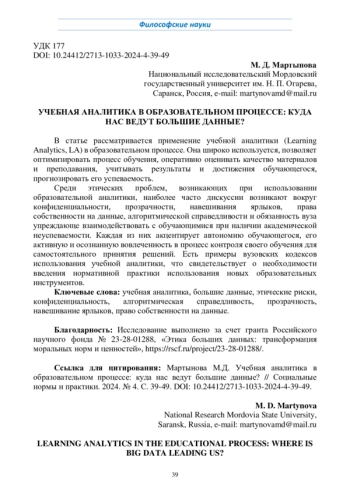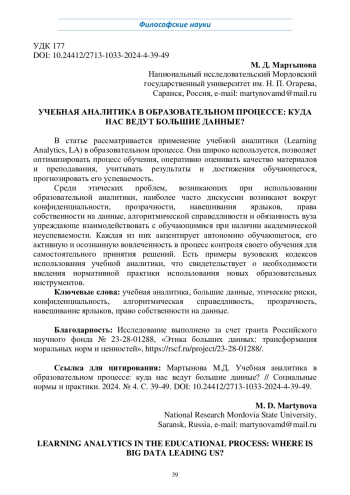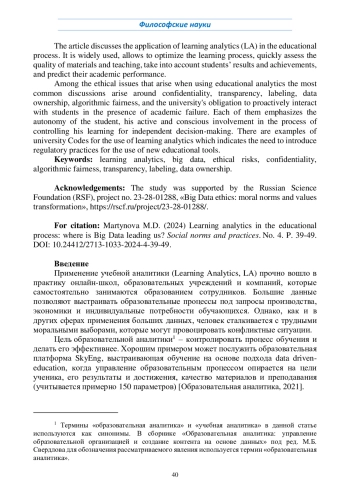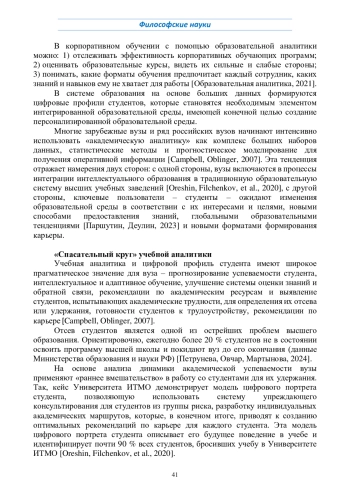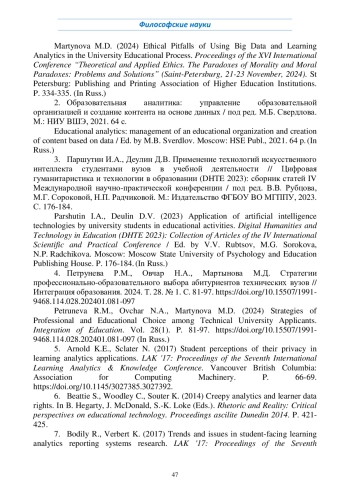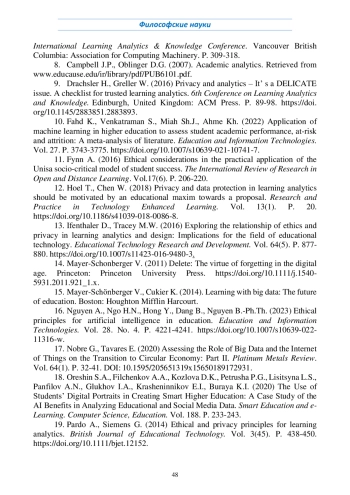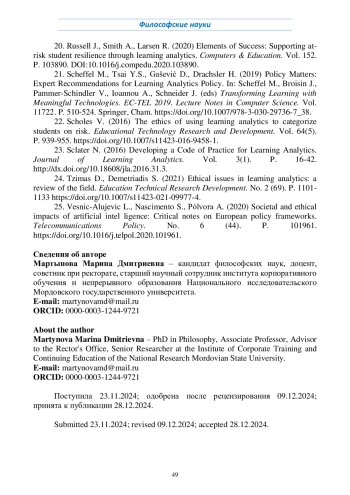1. Мартынова М.Д. Этические ловушки использования в образовательном процессе вуза BIG DATA и учебной аналитики // XVI Международная конференция “Теоретическая и прикладная этика: Традиции и перспективы - 2024: Парадоксальность морали и моральные парадоксы: проблемы и решения”. СПб.: Издательско-полиграфическая ассоциация высших учебных заведений, 2024. С. 334-335.
Martynova M.D. (2024) Ethical Pitfalls of Using Big Data and Learning Analytics in the University Educational Process. Proceedings of the XVI International Conference “Theoretical and Applied Ethics. The Paradoxes of Morality and Moral Paradoxes: Problems and Solutions” (Saint-Petersburg, 21-23 November, 2024). St Petersburg: Publishing and Printing Association of Higher Education Institutions. P. 334-335. (In Russ.).
2. Образовательная аналитика: управление образовательной организацией и создание контента на основе данных / под ред. М.Б. Свердлова. М.: НИУ ВШЭ, 2021. 64 с.
Educational analytics: management of an educational organization and creation of content based on data / Ed. by M.B. Sverdlov. Moscow: HSE Publ., 2021. 64 p. (In Russ.).
3. Паршутин И.А., Деулин Д.В. Применение технологий искусственного интеллекта студентами вузов в учебной деятельности // Цифровая гуманитаристика и технологии в образовании (DHTE 2023): сборник статей IV Международной научно-практической конференции / под ред. В.В. Рубцова, М.Г. Сороковой, Н.П. Радчиковой. М.: Издательство ФГБОУ ВО МГППУ, 2023. С. 176-184. EDN: AHEXZJ
Parshutin I.A., Deulin D.V. (2023) Application of artificial intelligence technologies by university students in educational activities. Digital Humanities and Technology in Education (DHTE 2023): Сollection of Articles of the IV International Scientific and Practical Conference / Ed. by V.V.Rubtsov, M.G. Sorokova, N.P. Radchikova. Moscow: Moscow State University of Psychology and Education Publishing House. P. 176-184. (In Russ.). EDN: AHEXZJ
4. Петрунева Р.М., Овчар Н.А., Мартынова М.Д. Стратегии профессионально-образовательного выбора абитуриентов технических вузов // Интеграция образования. 2024. Т. 28. № 1. С. 81-97. DOI: 10.15507/1991-9468.114.028.202401.081-097 EDN: AUEODW
Petruneva R.M., Ovchar N.A., Martynova M.D. (2024) Strategies of Professional and Educational Choice among Technical University Applicants.Integration of Education. Vol. 28(1). P. 81-97. (In Russ.). DOI: 10.15507/1991-9468.114.028.202401.081-097 EDN: AUEODW
5. Arnold K.E., Sclater N. (2017) Student perceptions of their privacy in learning analytics applications. LAK ‘17: Proceedings of the Seventh International Learning Analytics & Knowledge Conference. Vancouver British Columbia: Association for Computing Machinery. P. 66-69. DOI: 10.1145/3027385.3027392
6. Beattie S., Woodley C., Souter K. (2014) Creepy analytics and learner data rights. In B. Hegarty, J. McDonald, S.-K. Loke (Eds.). Rhetoric and Reality: Critical perspectives on educational technology. Proceedings ascilite Dunedin 2014. P. 421-425.
7. Bodily R., Verbert K. (2017) Trends and issues in student-facing learning analytics reporting systems research. LAK ‘17: Proceedings of the Seventh International Learning Analytics & Knowledge Conference. Vancouver British Columbia: Association for Computing Machinery. P. 309-318.
8. Campbell J.P., Oblinger D.G. (2007). Academic analytics. Retrieved from www.educause.edu/ir/library/pdf/PUB6101.pdf.
9. Drachsler H., Greller W. (2016) Privacy and analytics - It’ s a DELICATE issue. A checklist for trusted learning analytics. 6th Conference on Learning Analytics and Knowledge. Edinburgh, United Kingdom: ACM Press. P. 89-98. DOI: 10.1145/2883851.2883893
10. Fahd K., Venkatraman S., Miah Sh.J., Ahme Kh. (2022) Application of machine learning in higher education to assess student academic performance, at-risk and attrition: A meta-analysis of literature. Education and Information Technologies. Vol. 27. P. 3743-3775. DOI: 10.1007/s10639-021-10741-7 EDN: UBVVMR
11. Fynn A. (2016) Ethical considerations in the practical application of the Unisa socio-critical model of student success. The International Review of Research in Open and Distance Learning. Vol.17(6). P. 206-220.
12. Hoel T., Chen W. (2018) Privacy and data protection in learning analytics should be motivated by an educational maxim towards a proposal. Research and Practice in Technology Enhanced Learning. Vol. 13(1). P. 20. DOI: 10.1186/s41039-018-0086-8 EDN: YORFJE
13. Ifenthaler D., Tracey M.W. (2016) Exploring the relationship of ethics and privacy in learning analytics and design: Implications for the field of educational technology. Educational Technology Research and Development. Vol. 64(5). P. 877-880. DOI: 10.1007/s11423-016-9480-3 EDN: SEZJYN
14. Mayer-Schonberger V. (2011) Delete: The virtue of forgetting in the digital age. Princeton: Princeton University Press. DOI: 10.1111/j.1540-5931.2011.921_1.x
15. Mayer-Schönberger V., Cukier K. (2014). Learning with big data: The future of education. Boston: Houghton Mifflin Harcourt.
16. Nguyen A., Ngo H.N., Hong Y., Dang B., Nguyen B.-Ph.Th. (2023) Ethical principles for artificial intelligence in education. Education and Information Technologies. Vol. 28. No. 4. P. 4221-4241. DOI: 10.1007/s10639-022-11316-w EDN: SJZVYG
17. Nobre G., Tavares E. (2020) Assessing the Role of Big Data and the Internet of Things on the Transition to Circular Economy: Part II. Platinum Metals Review. Vol. 64(1). P. 32-41. DOI: 10.1595/205651319x15650189172931 EDN: EYOLZY
18. Oreshin S.A., Filchenkov A.A., Kozlova D.K., Petrusha P.G., Lisitsyna L.S., Panfilov A.N., Glukhov I.A., Krasheninnikov E.I., Buraya K.I. (2020) The Use of Students’ Digital Portraits in Creating Smart Higher Education: A Case Study of the AI Benefits in Analyzing Educational and Social Media Data. Smart Education and e-Learning.Computer Science, Education. Vol. 188. Р. 233-243.
19. Pardo A., Siemens G. (2014) Ethical and privacy principles for learning analytics. British Journal of Educational Technology. Vol. 3(45). P. 438-450. DOI: 10.1111/bjet.12152
20. Russell J., Smith A., Larsen R. (2020) Elements of Success: Supporting at-risk student resilience through learning analytics.Computers & Education. Vol. 152. P. 103890. DOI: 10.1016/j.compedu.2020.103890
21. Scheffel M., Tsai Y.S., Gašević D., Drachsler H. (2019) Policy Matters: Expert Recommendations for Learning Analytics Policy. In: Scheffel M., Broisin J., Pammer-Schindler V., Ioannou A., Schneider J. (eds) Transforming Learning with Meaningful Technologies. EC-TEL 2019. Lecture Notes in Computer Science. Vol. 11722. P. 510-524. Springer, Cham. DOI: 10.1007/978-3-030-29736-7_38
22. Scholes V. (2016) The ethics of using learning analytics to categorize students on risk. Educational Technology Research and Development. Vol. 64(5). P. 939-955. DOI: 10.1007/s11423-016-9458-1 EDN: BXPHHP
23. Sclater N. (2016) Developing a Code of Practice for Learning Analytics. Journal of Learning Analytics. Vol. 3(1). P. 16-42. DOI: 10.18608/jla.2016.31.3
24. Tzimas D., Demetriadis S. (2021) Ethical issues in learning analytics: a review of the field. Education Technical Research Development. No. 2 (69). P. 1101-1133. DOI: 10.1007/s11423-021-09977-4
25. Vesnic-Alujevic L., Nascimento S., Pólvora A. (2020) Societal and ethical impacts of artificial intel ligence: Critical notes on European policy frameworks. Telecommunications Policy. No. 6 (44). P. 101961. DOI: 10.1016/j.telpol.2020.101961 EDN: IZWQGK
